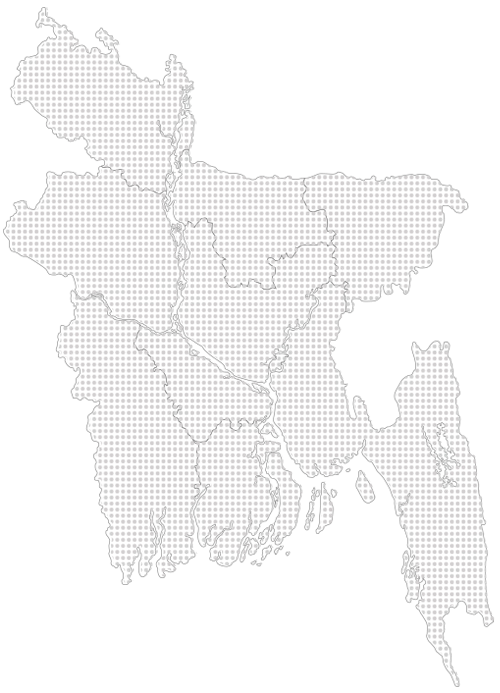Basic Elements of Interior Design
Interior design is the art and science of transforming any space into an attractive environment. Like every other work, interior design has some common elements. These elements are like guidelines for designers to convey a message to the users.
Apart from enhancing the appearance, these elements work together harmoniously to increase functionality. So it’s important to understand the basic elements of interior design. Learning how to use them to create effective spaces will be helpful.
Top Interior Design Firm7 Basic Elements of Interior Design
There are 7 basic elements for any interior design. These are,
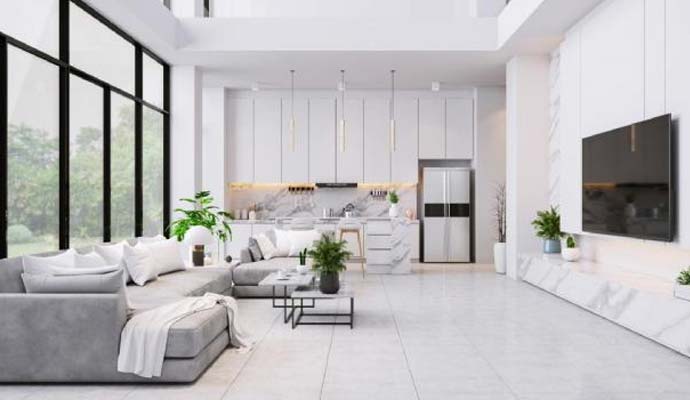
Space
Space is the foremost element used in interior design. It is the area within a room and defines the physical boundaries and limits you have to work with. All the other elements of interior design combine within any space. Different types of spaces in interior design need to be considered for a better design. Such as-
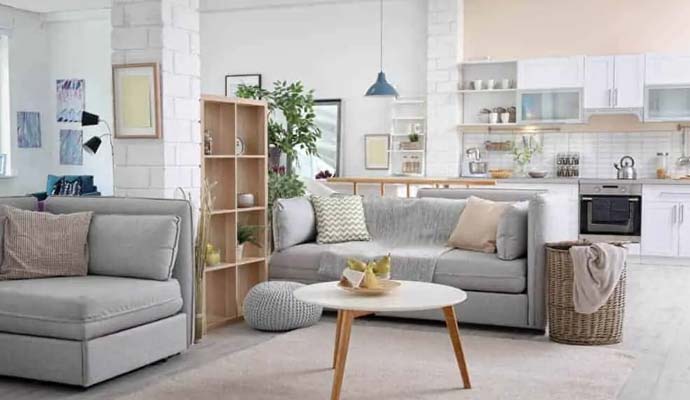
2D and 3D Space
2D spaces consider length and width, while 3D spaces are about height along with the other two. Interior designers mostly work within 3D spaces. Because length and width are important while flooring or placing carpet. And height is important while shelving or furniture alignment.
Positive and Negative Space
Positive space contains objects (furniture), while the negative one is the open space, including any space between objects. So balancing the negative and positive spaces is important to avoid clutter and for better navigation.
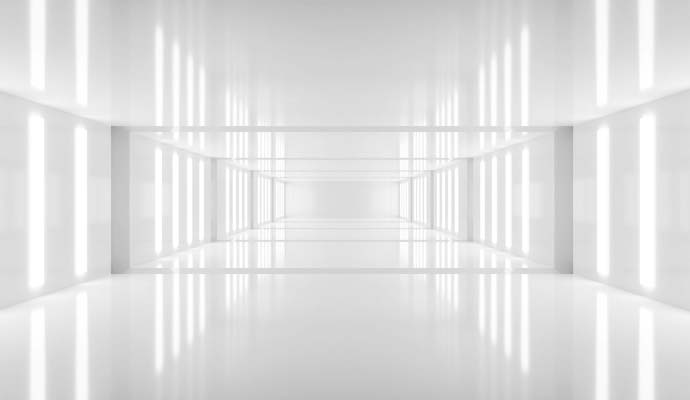
Line
Lines are the boundary that defines shapes. While drawing an object in a room, it’s generally started with the outlines. The form of a line creates a sense of direction of a focal point. It can direct you horizontally, vertically, or dynamically (diagonal, zigzag, or curve). Hence, we get 5 different types of lines−
- Horizontal Lines (up and down)
- Vertical Lines (side-to-side)
- Diagonal Lines (diagonally upwards or downwards)
- Zigzag Lines (represent movement, action, energy)
- Curved Lines (freeform, arcing, circular, or elliptical)
The way you choose to highlight the direction of lines will determine the mood you want to create.
Form/Shape
Form refers to the shape of any space and any object within the space. It’s the external boundary, outline, or external surface of an object enclosed by lines.
The form can be of two types: organic and geometric. Organic form refers to natural elements such as natural colors, plants, etc. In contrast, geometric forms are man-made, such as hard lines or angular edges of objects.
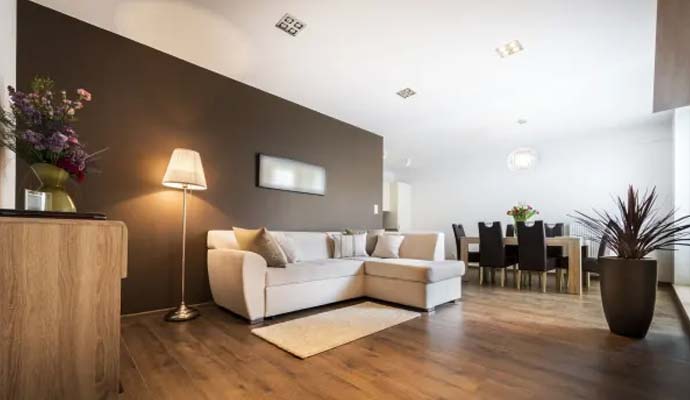
Light
Light is the lightness and darkness of any object or any space. Mood can also be transformed with light, making it a very powerful tool. Even with all the other elements, the interior of a space is incomplete without proper lighting. It can create the illusion of color, texture, movement, or pattern.
The light source can be of two types: natural or artificial (man-made). Intensity or usage of lights can also be broken into 3 categories depending on the task, accent, intensity, and mood. Whether it’s natural light or artificial light, quality lighting is essential for any space.
Need Interior Solution?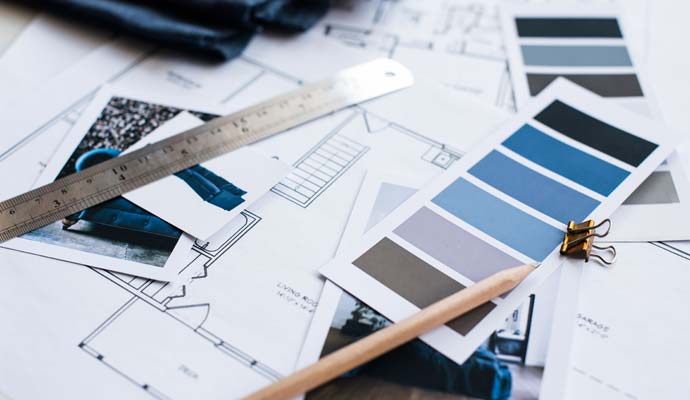
Color
Color is another important design element as it brings a space to life. It’s more of a science all on its own that shouldn’t be underestimated. It can stimulate memories and emotions or change moods. It can even influence our psychological responses.
For example, blue is one of those colors that induce calmness. So it’s more suitable for bedrooms or a space where one can relax. Color has several properties− hue, value, and intensity. Choosing the right colors depends on the activities too. So, interior designers must understand the accent and the usage of colors.
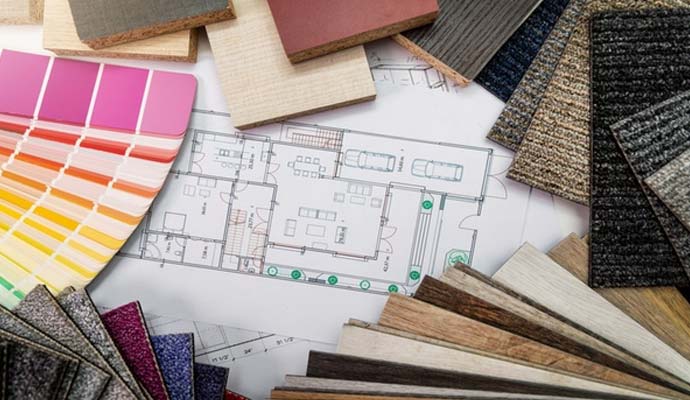
Texture
Another essential element of interior design is texture. It can be an object's visual appearance or physical feeling. Meaning it can be seen or felt. Therefore, we see two types of texture− visual textures (such as color or pattern) and actual textures (such as physical surfaces).
Pattern
Finally, the last one is the pattern. Patterns are the intended duplication of forms, lines, or multiple design elements working together. It can be applied to any form, like wallpaper, fabric, furniture, or lighting.
There are also types of patterns in interior design. Such as floral, stripes, geometric, complex, motif, and animal prints. Instead of just one type, a mixture of different patterns can bring life to a space. Not too many, though. Otherwise, it can be a chaotic look.
Bottom Line
The basic elements are like the building blocks of interior design. These are the rhythms in interior design that should always be considered to keep balance in interior design. Using them individually may not have much impact. But combined, each element can have a significant impact on any interior design project. Interior Studio Ace provides modern design solutions all over Bangladesh by fulfilling every basic element.
Request a QuotationOur Service Area
Please tell us about your residential home space or commercial space requirements. One of our creative, modern interior designers or interior decorator will walk you through our service options.
- Agrabad
- Akhalia
- Amber Khana
- Anderkilla
- Anwara
- Badda
- Bagerhat
- Bagh Bari (baghbari)
- Baizid
- Bakoliya
- Balaganj
- Banani
- Banani Dohs
- Bandar
- Bandar Bazar
- Bandarban
- Banglamotor
- Bangshal
- Banskhali
- Barguna
- Baridhara
- Barisal
- Basabo
- Basundhara
- Beanibazar
- Bhola
- Bimanbondor
- Bishwanath
- Boalkhali
- Bogra
- Brahmanbaria
- Cantonment
- Cda Avenue
- Chandanaish
- Chandgaon
- Chandpur
- Chapai Nawabganj
- Chawkbazar
- Chittagong
- Chouhatta
- Chuadanga
- Colonel Hat
- Comilla
- Companiganj
- Cox's Bazar
- Dargah Mahalla
- Demra
- Dhaka
- Dhamrai
- Dhanmondi
- Dinajpur
- Dohar
- Double Mooring
- Elephant Road
- Faridpur
- Fatikchari
- Fenchuganj
- Feni
- Gaibandha
- Gazipur
- Golapgan
- Gopalganj
- Gowainghat
- Gulshan
- Habiganj
- Halishahar
- Hathazari
- Hazaribagh
- Jaintapur
- Jamalkhan
- Jamalpur
- Jatrabari
- Jessore
- Jhalokati
- Jhenaidah
- Joypurhat
- Kafrul
- Kamrangirchar
- Kanaighat
- Karnafuly
- Kawranbazar
- Keraniganj
- Khagrachhari
- Khilgaon
- Khilkhet
- Khulna
- Khulshi
- Kishoreganj
- Kotowali
- Kumar Para
- Kurigram
- Kushtia
- Lakshmipur
- Lalbag
- Lalkhan Bazar
- Lalmonirhat
- Lama Bazar
- Lohagara
- Madaripur
- Magura
- Majortila
- Malibag
- Manikganj
- Meherpur
- Mirpur
- Mirpur Dohs
- Mirsharai
- Moghbazar
- Mohakhali
- Mohakhali Dohs
- Mohammadpur
- Motijheel
- Moulvibazar
- Munshiganj
- Muradpur
- Mymensingh
- Naogaon
- Narail
- Narayanganj
- Narsingdi
- Nasirabad
- Natore
- Nawabganj
- Nayasarak
- Nehari Para
- Netrokona
- New Market
- Nilphamari
- Noakhali
- Osmani Nagar
- Pabna
- Pahartali
- Paltan
- Panchagarh
- Panchlaish
- Patenga
- Pathan Tula
- Patiya
- Patuakhali
- Pirojpur
- Purbachal
- Rajbari
- Rajshahi
- Ramna
- Rampura
- Rangamati
- Rangpur
- Rangunia
- Raozan
- Sandwip
- Satkania
- Satkhira
- Savar
- Shahi Eidgah
- Shahporan
- Shajahanpur
- Shariatpur
- Sherpur
- Shibgonj
- Sholashahar
- Sirajganj
- Sitakunda
- South Surma
- Subhani Ghat
- Subid Bazar
- Sunamganj
- Sutrapur
- Sylhet
- Tangail
- Tejgaon
- Thakurgaon
- Tongi
- Uposhohor
- Uttara
- Wari
- Zakiganj
- Zinda Bazar
